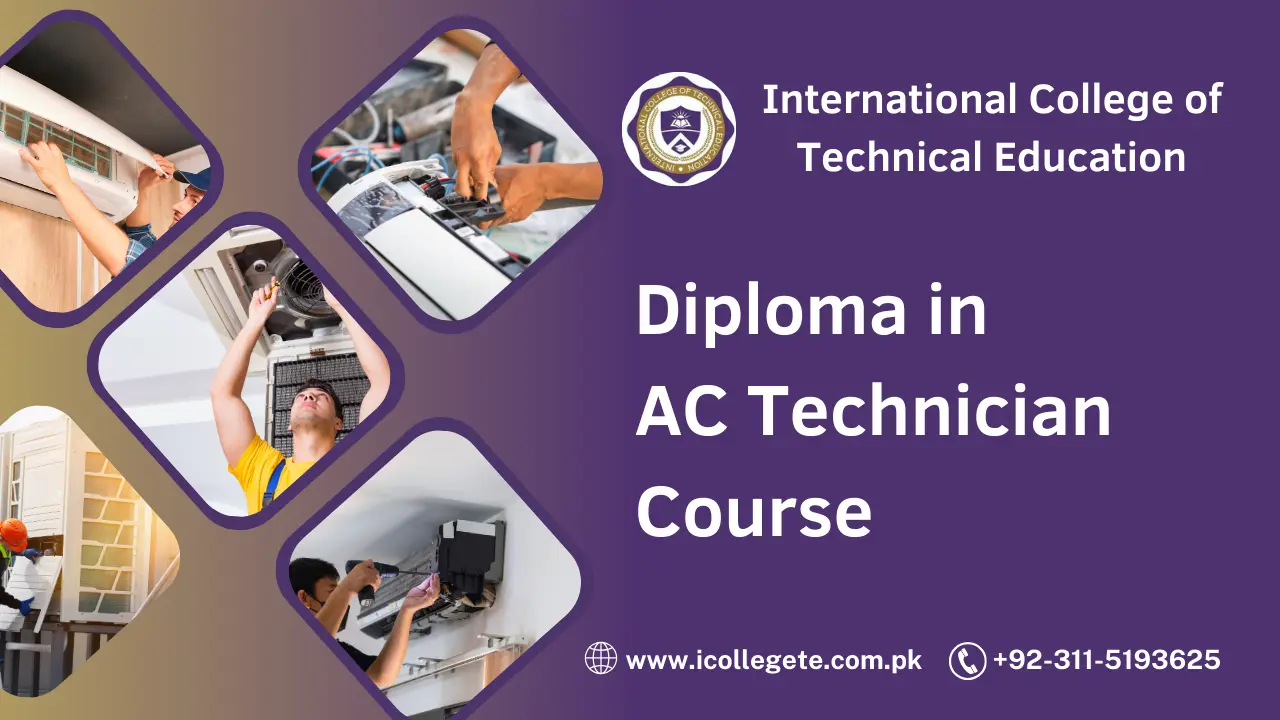In a world where climate control is no longer a luxury but a necessity, the role of Air Conditioning (AC) technicians becomes increasingly vital. The Diploma in AC Technician is a specialized program designed to cultivate the skills and knowledge required to excel in the dynamic field of air conditioning systems.
Diploma in Ac Technician
The Diploma in AC Technician is a targeted program aimed at providing individuals with the expertise needed to install, maintain, and repair air conditioning systems. Beyond the basics of temperature control, this diploma delves into the intricacies of AC technology, covering everything from refrigerants and compressors to system design and troubleshooting. With a perfect blend of theory and hands-on training, this program ensures that graduates are well-prepared for the challenges of the ever-evolving field of AC technology.
Course Benefits
The benefits of pursuing a Diploma in AC Technician extend beyond the classroom. This program offers a range of advantages, including:
- Specialized Skill Set: Graduates gain specialized skills in AC technology, making them valuable assets in an industry where expertise is highly sought after.
- Practical Training: The diploma incorporates hands-on training, allowing students to apply theoretical knowledge to real-world scenarios, ensuring they are job-ready upon completion.
- Versatility: AC technicians are in demand across various sectors, from residential and commercial services to industrial applications, providing graduates with diverse career opportunities.
- Industry-Relevant Knowledge: The program stays current with industry trends, ensuring that graduates are well-versed in the latest advancements in AC technology.
Study Units
The course structure is meticulously designed to cover a broad spectrum of topics essential for a career in AC technology. Some of the key study units include:
- Fundamentals of HVAC&R: An in-depth exploration of the principles and components that constitute heating, ventilation, air conditioning, and refrigeration systems.
- System Design and Installation: Understanding the nuances of designing and installing efficient and effective HVAC&R systems, including hands-on experience with various tools and equipment.
- Troubleshooting and Maintenance: Equipping students with the skills to identify and rectify faults in HVAC&R systems, ensuring optimal performance and longevity.
- Energy Efficiency and Sustainability: Exploring the latest trends and technologies in creating environmentally friendly and energy-efficient climate control solutions.
- Safety Protocols: Emphasizing the importance of safety measures and regulations in the HVAC&R industry to ensure a secure working environment.
Learning Outcomes
Upon completion of the Diploma in AC Technician program, graduates can expect to achieve the following learning outcomes:
- Technical Proficiency: Demonstrate a thorough understanding of HVAC&R systems and the ability to apply this knowledge in practical scenarios.
- Problem-Solving Skills: Develop the capacity to identify and resolve issues related to climate control systems efficiently.
- Safety Awareness: Adhere to industry-standard safety protocols to ensure a secure working environment for oneself and others.
- Communication Skills: Effectively communicate technical information to clients and colleagues, fostering clear and concise interactions in a professional setting.
- Adaptability: Stay abreast of the latest advancements in AC technology and adapt to evolving industry standards and practices.
Who is This Course For
The Diploma in AC Technician is tailored for a diverse group of individuals who aspire to carve a niche in the HVAC&R industry. This includes:
- High School Graduates: Ambitious individuals looking for a hands-on and rewarding career path right after completing their high school education.
- Career Switchers: Professionals from related fields seeking a change in career to explore new opportunities in the thriving HVAC&R sector.
- Technical Enthusiasts: Individuals passionate about technology and mechanics who want to specialize in a field with a direct impact on people’s comfort and well-being.
Future Progression
The future progression for Diploma in AC Technician graduates is promising and multifaceted. The acquired skills open doors to various career paths, including:
- HVAC Technician: Execute the installation, maintenance, and repair of heating, ventilation, air conditioning, and refrigeration systems.
- Energy Auditor: Assess and optimize energy consumption in buildings, suggesting improvements for enhanced efficiency.
- Project Management: Transition into project management roles, overseeing the design and implementation of HVAC&R systems in diverse settings.
- Entrepreneurship: Start a venture providing HVAC&R services, catering to the ever-growing demand for climate control solutions.
- Further Education: Pursue advanced degrees or certifications in specialized areas such as energy management, sustainable design, or HVAC system automation.
In conclusion, the Diploma in AC Technician serves as a launchpad for individuals eager to embark on a fulfilling journey in the HVAC&R industry. The comprehensive curriculum, coupled with practical experience, ensures that graduates are well-prepared for the challenges and opportunities that lie ahead in this ever-evolving field. As industries continue to prioritize climate control and sustainability, the demand for skilled AC technicians is only set to rise, making this diploma a strategic investment in a successful and impactful career.


